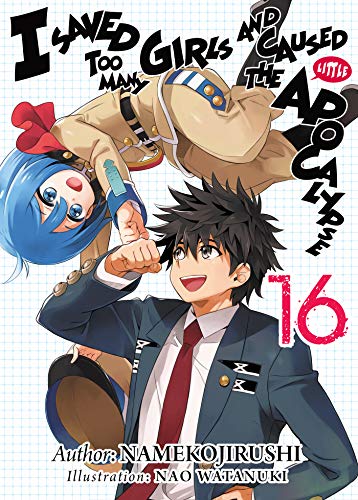By Namekojirushi and Nao Watanuki. Released in Japan as “Ore ga Heroine o Tasukesugite Sekai ga Little Mokushiroku!?” by Hobby Japan. Released in North America digitally by J-Novel Club. Translated by Mana Z.
The final volume of Little Apocalypse, and I’ll try to keep my general thoughts above the picture and then get into actual spoilers below it. It’s a good final volume, I was pleased. The series knows what it does best and does it. Big ol’ melee fights, lots of humor, lots of self-doubt, Rekka being Rekka – indeed, you could argue the plot of this book is Rekka being Rekka. Including Rekka being dense, which he confirms here is sometimes deliberate, but also confirms here that sometimes he really is just that dense. Also, to my relief, despite appearing on the cover at last, R does not become a “heroine” in the romantic sense. There’s explanations for previous major plot points, each of the girls gets to do at least something, even if it’s sit on the sidelines and write/direct (you can guess who I’m talking about there). Fans of the series should not really have any issues with it at all… well, OK, except maybe for one thing.
Yes, if you wanted romantic resolution, first of all, you were deluding yourself, but second of all, you will be disappointed as Rekka does not, in fact, choose anyone. Indeed, the villain of the piece, if you can call him that, is Rekka from the future, and he makes it clear that he’s saved hundreds of heroines and loves all of them. The trouble, of course, is that Rekka loves all these heroines in the earnest, hero sense of love. There is no romantic or sexual love here, and indeed beyond getting flustered occasionally when confronted with boobs, Rekka is a decidedly uninterested hero. This applies to him, to his female self (and one big drawback of the book is that we never met any of the heroes that she saved – or did she save heroines? Her sexuality is just as absent as Rekka’s). As for future Rekka, he may be an immortal vampire with cyborg arms, but at heart he’s still the same guy, which means he has the same self-doubts.
The goddesses who are the cause of all this are perhaps the least interesting part of the book – I joked that one reminded me of Aqua, but that was more the way she was initially introduced. There is an interesting idea here in that the gods literally CANNOT stop making and destroying worlds as that is their function, it’s what they do. This is what led to the surprisingly bloodless War of All, whose sole casualty that we know about (Iris’ father) is undone by the ending fight presumably making it so the war never happens. It also felt right that the one who helped our Rekka to finally defeat his future self was R, and that she did it not through caustic words and innuendo – her weapons so far – but just by giving him a big push. If only getting him to pick a girl was that easy.
And so the series is over, everything is back to where it was, and Rekka will no doubt keep saving heroines, though hopefully on a slightly smaller scale. This started out as a parody of the harem genre, but by the end it had embraced what it mocked, and I feel it’s the better for it.

